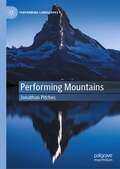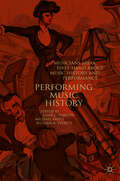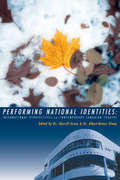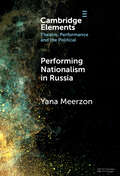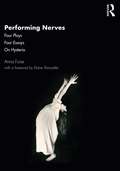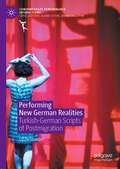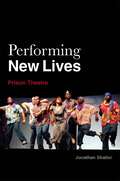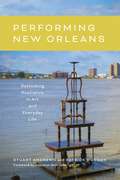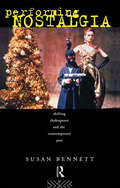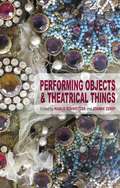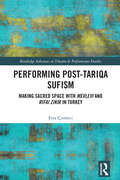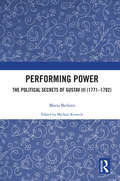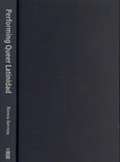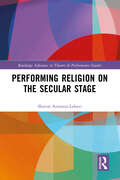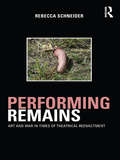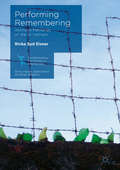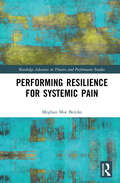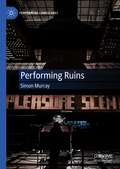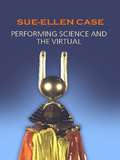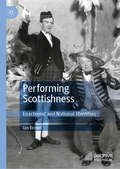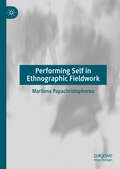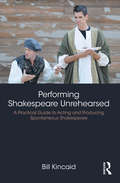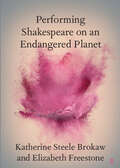- Table View
- List View
Performing Mountains (Performing Landscapes)
by Jonathan PitchesLaunching the landmark Performing Landscapes series, Performing Mountains brings together for the first time Mountain Studies and Performance Studies in order to examine an international selection of dramatic responses to mountain landscapes. Moving between different registers of writing, the book offers a critical assessment of how the cultural turn in landscape studies interacts with the practices of environmental theatre and performance. Conceived in three main parts, it begins by unpicking the layers of disciplinary complexity in both fields, before surveying the rich history and practice of rituals, playtexts and site specific works inspired by mountains. The last section moves to a unique analysis of mountains themselves using key concepts from performance: training, scenography, acting and spectatorship. Threaded throughout is a very personal tale of mountain research, offering a handrail or alternative guide through the book.
Performing Music History: Musicians Speak First-Hand about Music History and Performance
by John C. Tibbetts William A. Everett Michael SafflePerforming Music History offers a unique perspective on music history and performance through a series of conversations with women and men intimately associated with music performance, history, and practice: the musicians themselves. Fifty-five celebrated artists—singers, pianists, violinists, cellists, flutists, horn players, oboists, composers, conductors, and jazz greats—provide interviews that encompass most of Western music history, from the Middle Ages to contemporary classical music, avant-garde innovations, and Broadway musicals. The book covers music history through lenses that include “authentic” performance, original instrumentation, and social context. Moreover, the musicians interviewed all bring to bear upon their respective subjects three outstanding qualities: 1) their high esteem in the music world as immediately recognizable names among musicians and public alike; 2) their energy and devotion to scholarship and the recovery of endangered musical heritages; and 3) their considerable skills, media savvy, and showmanship as communicators. Introductory essays to each chapter provide brief synopses of historical eras and topics. Combining careful scholarship and lively conversation, Performing Music History explores historical contexts for a host of fascinating issues.
Performing National Identities
by Sherrill Grace Albert-Reiner GlaapA collection of eighteen original essays on contemporary Canadian theatre by scholars and drama specialists in Canada, Great Britain, Europe, Australia, Hungary, and Japan. The international scope of the volume, reflected in its co-editors (Sherrill Grace from Canada, Albert-Reiner Glaap from Germany), confirms the new importance of Canadian plays on the world stage.
Performing Nationalism in Russia (Elements in Theatre, Performance and the Political)
by Yana MeerzonFollowing Homi Bhabha's prompt on reading nationalism as a set of discursive and performative practices, this Element focuses on the cultural geography of today's Russia and examines a range of performative strategies used by the Russian state to uphold its nationalist project. Simultaneously, it maps artistic strategies of resistance to the ideology of nationalism as employed by both state-funded and independent theatre companies, via new dramaturgies, performance practices and strategies of storytelling.
Performing Nerves: Four Plays, Four Essays, On Hysteria
by Anna FurseAcademic interest in hysteria has burgeoned in recent decades. The topic has been probed by feminist theorists, cultural studies specialists, literary scholars, anthropologists, sociologists, psychologists, medical and art historians, as well as novelists. The hysteric is construed as a powerless, voiceless subject, marginalised by the forces of the patriarchy that have been the root cause of their distress, dissembling, and disablement. In Performing Nerves, Anna Furse interweaves her artistic and academic practice, drawing on her own performance texts to explore four different versions of debilitating hysteric suffering. Each text is extensively annotated, revealing the dramaturgical logic and, in turn, the historical, medical, and cultural contexts behind their protagonists' illnesses, which are argued as environmentally caused in each case. This unique, reflective insight into a playwright and director’s craft offers not only an account of how mental suffering can manifest in different contexts and times, from the 19th century to today, but also a breadth of access to the ideas that can motivate creative research. This book is an invaluable resource for scholars of theatre studies, performance studies, dramaturgy, 20th-century history, gender studies, and medical humanities.
Performing New German Realities: Turkish-German Scripts of Postmigration (Contemporary Performance InterActions)
by Lizzie Stewart'One in four people in Germany today have a so-called migration background, however, the relationship between theatre and migration there has only recently begun to take centre stage. Indeed, fifty years after large-scale Turkish labour migration to the Federal Republic of Germany began, theatre by Turkish-German artists is only now becoming a consistent feature of Germany’s influential state-funded theatrical landscape. Drawing on extensive archival and field work, this book asks where, when, why, and how plays engaging with the new realities of “postmigrant” Germany have been performed over the past 30 years. Focusing on plays by renowned artists Emine Sevgi Özdamar, and Feridun Zaimoglu/Günter Senkel, it asks which new realities have been scripted in the theatrical sphere in the process – in the imaginations of playwrights, readers, audience members; in the enactment and direction of scripts on stage; and in the performance of new institutional approaches and cultural policies. Highlighting the role this theatre has played in a larger, ongoing re-scripting of the German stage, this study presents a critical perspective on contemporary European theatre and opens innovative developments in the conceptualization of theatre and post/migration from the German context to English language readers.
Performing New Lives
by Jonathan ShailorPerforming New Lives draws together some of the most original and innovative programs in contemporary prison theatre. Leading prison theatre directors and practitioners discuss the prison theatre experience first-hand, and offer valuable insights into its role, function, and implementation. A wide range of prison theatre initiatives are discussed, from long-running, high-profile programs such as Curt Tofteland's "Shakespeare Behind Bars" in LaGrange, Kentucky, to fledgling efforts like Jodi Jinks' "ArtsAloud" project in Austin, Texas. The book offers unique insights into the many dimensions of the prison theatre experience, including: negotiating the rules and restrictions of the prison environment; establishing trust, teaching performance skills and managing crises; building relationships and dealing with conflicts; and negotiating public performances and public perceptions. Excerpts of interviews with inmates, and a conversation between practitioners in the final chapter, reveal the impact that prison theatre programs have on the performers themselves, as well as audience members, and the wider community. Exploring prison theatre processes and theory with insights into how it works in practice, and how to replicate it, this book is essential reading for drama therapists, theatre artists, and prison educators, as well as academics.
Performing New Orleans: Rethinking Resilience in Art and Everyday Life
by Stuart Andrews Patrick DugganPerforming New Orleans examines the value of arts and culture in managing complex urban challenges, offering new perspectives on how artistic and everyday performances can be pivotal modes of practicing resilience. Through an exploration of understudied forms of performance in New Orleans, Stuart Andrews and Patrick Duggan highlight the centrality of the city’s arts ecosystems as a vital aspect of its ability to “perform” resiliency.Performing New Orleans resists conventional definitions of arts practice; instead, it uses a diverse array of case studies to illustrate what arts practices are, what they do, and how they can enhance our understanding of people, place, and resilience. The case studies in this volume range from playing in the streets to painting murals; from tourist flourishes to the performative effect of infrastructure projects; from the design and leadership of arts centers to the unfolding of festivals, theater performances, art installations, and even public health messaging. The authors also review, critique, and rethink resilience theory and the often problematic idea of “being resilient.”Andrews and Duggan bring together ideas from art and architecture, cultural geography, hazard mitigation, resilience theory, sustainability, theater, and water management to explore “performances” of the city to radically expand our understanding of urban adaptability. Performing New Orleans argues that a truly resilient city is one that recognizes arts and culture professionals as crucial, critical innovators.
Performing Nostalgia: Shifting Shakespeare and the Contemporary Past
by Susan BennettIn this trenchant work, Susan Bennett examines the authority of the past in modern cultural experience and the parameters for the reproduction of the plays. She addresses these issues from both the viewpoints of literary theory and theatre studies, shifting Shakespeare out of straightforward performance studies in order to address questions about his plays and to consider them in the context of current theoretical debates on historiography, post-colonialism and canonicity.
Performing Oaths in Classical Greek Drama
by Judith FletcherOaths were ubiquitous rituals in ancient Athenian legal, commercial, civic and international spheres. Their importance is reflected by the fact that much of surviving Greek drama features a formal oath sworn before the audience. This is the first comprehensive study of that phenomenon. The book explores how the oath can mark or structure a dramatic plot, at times compelling characters like Euripides' Hippolytus to act contrary to their best interests. It demonstrates how dramatic oaths resonate with oath rituals familiar to the Athenian audiences. Aristophanes' Lysistrata and her accomplices, for example, swear an oath that blends protocols of international treaties with priestesses' vows of sexual abstinence. By employing the principles of speech act theory, this book examines how the performative power of the dramatic oath can mirror the status quo, but also disturb categories of gender, social status and civic identity in ways that redistribute and confound social authority.
Performing Objects and Theatrical Things
by Marlis Schweitzer Joanne ZerdyThis book rethinks historical and contemporary theatre, performance, and cultural events by scrutinizing and theorizing the objects and things that activate stages, venues, environments, and archives.
Performing Orthodox Ritual in Byzantium
by Andrew Walker WhiteIn this groundbreaking, interdisciplinary study, Andrew Walker White explores the origins of Byzantine ritual - the rites of the early Greek Orthodox Church - and its unique relationship with traditional theatre. Tracing the secularization of pagan theatre, the rise of rhetoric as an alternative to acting, as well as the transmission of ancient methods of musical composition into the Byzantine era, White demonstrates how Christian ritual was in effect a post-theatrical performing art, created by intellectuals who were fully aware of traditional theatre but who endeavoured to avoid it. The book explores how Orthodox rites avoid the aesthetic appreciation associated with secular art, and conducts an in-depth study (and reconstruction) of the late Byzantine Service of the Furnace. Often treated as a liturgical drama, White translates and delineates the features of five extant versions, to show how and why it generated widely diverse audience reactions in both medieval times and our own.
Performing Post-Tariqa Sufism: Making Sacred Space with Mevlevi and Rifai Zikir in Turkey (Routledge Advances in Theatre & Performance Studies)
by Esra ÇizmeciThis ethnographic research project examines the generation of post-tariqa Tasavvuf (Sufism: a spiritual practice and philosophy recognised as the inner dimension of Islam) in a variety of private, semi-public, public, secular and sacred urban spaces in present-day Turkey. Through extensive field research in minority Sufi communities, this book investigates how devotees of specific orders maintain, adapt, mobilise, and empower their beliefs and values through embodied acts of their Sufi followers. Using an ethnographic methodology and theories derived from performance studies, Esra Çizmeci examines the multiple ways in which the post-tariqa Mevlevi and Rifai practice is formed in present-day Turkey, such as through the authority of the spiritual teacher; the individual and collective performance of Sufi rituals; nefs (self) training; and, most importantly, the practice of Sufi doctrines in everyday life through the production of sacred spaces. Drawing on the theories of performance, she examines how the Sufi way of living and spaces are created anew in the process of each devotee’s embodied action. This book is informed by theories in performance studies, anthropology, religious studies, and cultural studies and places current Sufi practices in a historical perspective.
Performing Power: The Political Secrets of Gustav III (1771-1792)
by Maria BerlovaPerforming Power explores 18th-century fabrication of the royal image by focusing on the example of King Gustav III (1746–1792) – one of Sweden’s most acclaimed and controversial monarchs – who conspicuously chose theater as the primary media for his image-making and role construction. The text postulates that Gustav III was motivated by theater’s ability to aid him in fulfilling Enlightenment’s tenet of broadly educating the populace and inculcating it with royal ideology. That he was an amateur actor, stage director, and playwright were other engines driving his choice. The project challenges and expands the commonly accepted perception of Gustav III’s contribution to Swedish theater, which has generally been limited to founding its National Opera, developing its national drama, and forming its national dramatic repertoire. Maria Berlova presents Gustav III as a performing King who strategically used political events as a framework through which he could embody the image of the ideal or enlightened monarch as presented by Voltaire. Through this, Performing Power explores the tight relationship and complex bond between theatrical arts and politics. This unique study will be of great interest to students and scholars in theater studies, 18th-century culture, and politics.
Performing Queer Latinidad: Dance, Sexuality, Politics
by Rivera-Servera Ramón H.Performing Queer Latinidad highlights the critical role that performance played in the development of Latina/o queer public culture in the United States during the 1990s and early 2000s, a period when the size and influence of the Latina/o population was increasing alongside a growing scrutiny of the public spaces where latinidad could circulate. Performances---from concert dance and street protest to the choreographic strategies deployed by dancers at nightclubs---served as critical meeting points and practices through which LGBT and other nonnormative sex practitioners of Latin American descent (individuals with greatly differing cultures, histories of migration or annexation to the United States, and contemporary living conditions) encountered each other and forged social, cultural, and political bonds. At a time when latinidad ascended to the national public sphere in mainstream commercial and political venues and Latina/o public space was increasingly threatened by the redevelopment of urban centers and a revived anti-immigrant campaign, queer Latinas/os in places such as the Bronx, San Antonio, Austin, Phoenix, and Rochester, NY, returned to performance to claim spaces and ways of being that allowed their queerness and latinidad to coexist. These social events of performance and their attendant aesthetic communication strategies served as critical sites and tactics for creating and sustaining queer latinidad.
Performing Religion on the Secular Stage (Routledge Advances in Theatre & Performance Studies)
by Sharon Aronson-LehaviThis book examines the relations between Western religion, secularism, and modern theater and performance. Sharon Aronson-Lehavi posits that the ongoing cultural power of religious texts, icons, and ideas on the one hand and the artistic freedom enabled by secularism and avant-garde experimentalism on the other, has led theatre artists throughout the twentieth century to create a uniquely modern theatrical hybrid–theater performances that simultaneously re-inscribe and grapple with religion and religious performativity. The book compares this phenomenon with medieval forms of religious theater and offers deep and original analyses of significant contemporary works ranging from plays and performances by August Strindberg, Hugo Ball (Dada), Jerzy Grotowski, and Hanoch Levin, to those created by Adrienne Kennedy, Rina Yerushalmi, Deb Margolin, Milo Rau, and Sarah Ruhl. The book analyzes a new and original historiography of a uniquely modern theatrical phenomenon, a study that is of high importance considering the reemergence of religion in contemporary culture and politics.
Performing Remains: Art and War in Times of Theatrical Reenactment
by Rebecca Schneider'At last, the past has arrived! Performing Remains is Rebecca Schneider's authoritative statement on a major topic of interest to the field of theatre and performance studies. It extends and consolidates her pioneering contributions to the field through its interdisciplinary method, vivid writing, and stimulating polemic. Performing Remains has been eagerly awaited, and will be appreciated now and in the future for its rigorous investigations into the aesthetic and political potential of reenactments.' - Tavia Nyong'o, Tisch School of the Arts, New York University 'I have often wondered where the big, important, paradigm-changing book about re-enactment is: Schneider’s book seems to me to be that book. Her work is challenging, thoughtful and innovative and will set the agenda for study in a number of areas for the next decade.' - Jerome de Groot, University of Manchester Performing Remains is a dazzling new study exploring the role of the fake, the false and the faux in contemporary performance. Rebecca Schneider argues passionately that performance can be engaged as what remains, rather than what disappears. Across seven essays, Schneider presents a forensic and unique examination of both contemporary and historical performance, drawing on a variety of elucidating sources including the "America" plays of Linda Mussmann and Suzan-Lori Parks, performances of Marina Abramovic´ and Allison Smith, and the continued popular appeal of Civil War reenactments. Performing Remains questions the importance of representation throughout history and today, while boldly reassessing the ritual value of failure to recapture the past and recreate the "original."
Performing Remembering: Women's Memories of War in Vietnam (Contemporary Performance InterActions)
by Rivka Syd EisnerThis book explores the performances and politics of memory among a group of women war veterans in Ho Chi Minh City, Vietnam. Through ethnographic, oral history-based research, it connects the veterans’ wartime histories, memory politics, performance practices, recollections of imprisonment and torture, and social activism with broader questions of how to understand and attend to continuing transgenerational violence and trauma. With an extensive introduction and subsequent chapters devoted to in-depth analysis of four women’s remarkable life stories, the book explores the performance and performativity of culture; ethnographic oral history practice; personal, collective, and (trans)cultural memory; and the politics of postwar trauma, witnessing, and redress. Through the veterans’ dynamic practices of prospective remembering, 'pain-taking', and enduring optimism, it offers new insights into matrices of performance vital to the shared work of social transformation. It will appeal to readers interested in performance studies, memory studies, gender studies, Vietnamese studies, and oral history.
Performing Resilience for Systemic Pain (Routledge Advances in Theatre & Performance Studies)
by Meghan Moe BeitiksHow might performance serve as a means for facing ubiquitous trauma and pain, in humans and ecologies? While reflecting on her multidisciplinary work Systems of Pain/Networks of Resilience, artist Meghan Moe Beitiks considers bodies of knowledge in Trauma Theory, Intersectional Feminist Philosophy, Ecology, Disability Studies, New Materialism, Object-Oriented Ontology, Gender Studies, Artistic Research, Psychology, Performance Studies, Social Justice, Performance Philosophy, Performance Art, and a series of first-person interviews in an attempt to answer that question. Beitiks brings us through the first-person process of making the work and the real-life, embodied encounters with the theories explored within it as an expansion of the work itself. Facing down difficult issues like trauma, discrimination, and the vulnerability of the body, Beitiks looks to commonalities across species and disciplines as means of developing resilience and cultivating communities. Rather than paint a picture of glorious potential utopias, Beitiks takes a hard look at herself as an embodiment of the values explored in the work, and stays with the difficult, sucky, troubling, work to be done. Performing Resilience for Systemic Pain is a vulnerable book about the quiet presence and hard looking needed to shift systems away from their oppressive, destructive realities.
Performing Ruins (Performing Landscapes)
by Simon MurrayThis book engages with the relationship between ruins, dilapidation, and abandonment and cultural events performed within such spaces. Following the author’s fieldwork in the UK, Bosnia Herzegovina, Poland, Germany, Greece, and Sicily, chapters describe, investigate, and reflect upon live performance events which have taken place in sites of decay and abandonment. The book’s main focus is upon modern economic ruins and ruins of warfare. Each chapter provides several case studies based upon the author’s own site visits and interviews with actors, directors, producers, curators, writers, and other artists. The book contextualises these events within the wider framework of Ruin Studies and provides brief summaries of how we might understand the ruin in terms of time, politics, culture, and atmospheres. The book is particularly preoccupied with artists’ reasons and motivations for placing performance events in ruined spaces and how these work dramaturgically.
Performing Science and the Virtual
by Sue-Ellen CaseThis impressive new book from Sue-Ellen Case looks at how science has been performed throughout history, tracing a line from nineteenth century alchemy to the twenty-first century virtual avatar. In this bold and wide-ranging book that is written using a crossbreed of styles, we encounter a glance of Edison in his laboratory, enter the soundscape of John Cage and raid tombs with Lara Croft. Case looks at the intersection of science and performance, the academic treatment of classical plays and internet-like bytes on contemporary issues and experiments where the array of performances include: electronic music Sun Ra, the jazz musician the recursive play of tape from Samuel Beckett to Pauline Oliveros Performing Science and the Virtual reviews how well these performances borrow from spiritualist notions of transcendence, as well as the social codes of race, gender and economic exchange. This book will appeal to academics and graduates studying theatre and performance studies, cultural studies and philosophy.
Performing Scottishness: Enactment and National Identities
by Ian BrownThis wide-ranging and ground-breaking book, especially relevant given Brexit and renewed Scottish independence campaigning, provides in-depth analysis of ways Scottishness has been performed and modified over the centuries. Alongside theatre, television, comedy, and film, it explores performativity in public events, Anglo-Scottish relations, language and literary practice, the Scottish diaspora and concepts of nation, borders and hybridity. Following discussion of the 1320 Declaration of Arbroath and the real meanings of the 1706/7 Treaty of Union, it examines the differing perceptions of what the ‘United Kingdom’ means to Scots and English. It contrasts the treatment of Shakespeare and Burns as ‘national bards’ and considers the implications of Scottish scholars’ invention of ‘English Literature’. It engages with Scotland’s language politics –rebutting claims of a ‘Gaelic Gestapo’ – and how borders within Scotland interact. It replaces myths about ‘tartan monsters’ with level-headed evidence before discussing in detail representations of Scottishness in domestic and international media.
Performing Self in Ethnographic Fieldwork
by Marilena PapachristophorouThis provocative book presents a methodological proposal for teaching ethnographic fieldwork, applying interdisciplinary tools inspired from performance theory, acting, experiential anthropology and existential psychotherapy. At the same time, it constitutes a theoretical and methodological trajectory mapping the history of ethnographic fieldwork through highly characteristic moments along with the author's own personal journey in the field in terms of a lifetime project. Starting from the assumption that ethnographic fieldwork constitutes a deeply human experience, the book proposes a step further towards the performative dimension of an ethnographic condition inspired by the Stanislavski method, which in practice complements performance theory issues: it is argued that participant observation offers an intermediate identity for the ethnographer through a conscious management of the social "role" dictated by their research participants; this ethnographic mediation of the Self may also have psychotherapeutic effects, mainly through conscious management of self-diversity and reflexivity in ethnographic writing. Ethnographic fieldwork is thus highlighted as a performative stage and a field of deep transformations for the ethnographer’s identity.
Performing Shakespeare Unrehearsed: A Practical Guide to Acting and Producing Spontaneous Shakespeare
by Bill KincaidPerforming Shakespeare Unrehearsed: A Practical Guide to Acting and Producing Spontaneous Shakespeare outlines how Shakespeare’s plays can be performed effectively without rehearsal, if all the actors understand a set of performance guidelines and put them into practice. Each chapter is devoted to a specific guideline, demonstrating through examples how it can be applied to pieces of text from Shakespeare’s First Folio, how it creates blocking and stage business, and how it enhances story clarity. Once the guidelines have been established, practical means of production are discussed, providing the reader with sufficient step-by-step instruction to prepare for Unrehearsed performances. This book is written for the actor and performer.
Performing Shakespeare on an Endangered Planet (Elements in Shakespeare Performance)
by Katherine Steele Brokaw Elizabeth FreestoneGiven the many environmental crises facing the planet, we need to use all tools to address them, including Shakespearean theatre. This Element explains why Shakespeare is well-positioned to be an eco-playwright, how theatre-makers can adapt his plays to matter now, and how to make more ecological the many processes of Shakespearean theatre, from set design to performing outdoors. The co-authors are both directors, and conversations between them about their recent eco-productions of The Tempest for the Royal Shakespeare Company and A Midsummer Night's Dream for Shakespeare in Yosemite (California) give clear examples of both the why and how of eco-theatrical Shakespeare.
